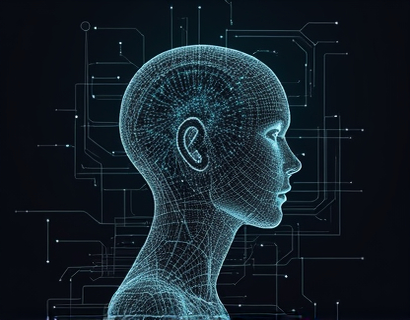AI-Generated Podcasts: Revolutionizing Audio Entertainment with Intelligent Content for Engaged Listeners
The landscape of audio entertainment is undergoing a significant transformation with the advent of AI-generated podcasts. These innovative productions leverage advanced algorithms and machine learning to create immersive and engaging content, redefining the way listeners interact with audio media. The integration of artificial intelligence in podcast creation is not just a novelty but a game-changer, offering unprecedented opportunities for content creators and listeners alike.
The core of AI-generated podcasts lies in their ability to analyze vast amounts of data, understand complex patterns, and generate high-quality audio content that resonates with diverse audiences. By utilizing natural language processing (NLP) and deep learning techniques, these podcasts can produce scripts that are not only coherent and contextually relevant but also emotionally engaging. This technological synergy ensures that the content is tailored to the interests and preferences of individual listeners, enhancing their overall experience.
One of the most compelling aspects of AI-generated podcasts is their capacity to cover a wide range of topics with depth and nuance. Traditional podcasts often rely on human hosts and pre-written scripts, which can limit the breadth and frequency of content release. In contrast, AI can continuously generate new episodes on various subjects, from in-depth analyses of current events to explorations of niche hobbies and interests. This constant flow of fresh content keeps listeners engaged and coming back for more, as they can always find something new and relevant to their tastes.
The process of creating an AI-generated podcast begins with defining the scope and theme of the show. Content strategists input key topics, desired tone, and target audience preferences into the AI system. The algorithm then works behind the scenes to craft a compelling narrative, develop character dialogues, and structure the episode flow. Advanced NLP models ensure that the generated content sounds natural and authentic, avoiding the robotic tone that was a hallmark of early AI text generation.
Once the script is ready, voice synthesis technology comes into play. Modern voice generators can mimic human speech patterns with remarkable accuracy, allowing the podcast to sound as if it were hosted by real people. This technology not only enhances the listening experience but also reduces the need for extensive voice acting, making the production process more efficient and cost-effective. The result is a high-quality audio product that can compete with traditionally produced podcasts in terms of sound and presentation.
Another significant advantage of AI-generated podcasts is their adaptability and personalization capabilities. By analyzing listener data and feedback, the AI can adjust the content to better suit audience preferences over time. This dynamic approach ensures that the podcast remains relevant and engaging, fostering a loyal listener base. For instance, if a particular segment or topic receives high engagement, the AI can produce more content in that vein, while also introducing new elements to keep the content fresh and exciting.
The impact of AI-generated podcasts extends beyond just content creation. They are also transforming the way podcasts are discovered and consumed. Traditional podcast platforms often struggle with content overload, making it challenging for new shows to stand out. AI can address this issue by curating personalized recommendations based on individual listening habits. This targeted approach not only helps new AI-generated podcasts gain visibility but also enhances the overall user experience by reducing the time and effort required to find quality content.
Moreover, AI-generated podcasts can break down language barriers and make high-quality audio content accessible to a global audience. By incorporating multilingual capabilities and cultural context understanding, these podcasts can cater to listeners from different regions and backgrounds. This inclusivity not only broadens the potential listener base but also promotes cross-cultural understanding and dialogue.
The creative potential of AI in podcasting is vast and continually expanding. While current AI models excel at generating scripts and voiceovers, the future holds even more exciting possibilities. For example, AI could be used to create immersive audio experiences that incorporate sound design and music composition, further enriching the listening experience. Imagine a podcast that not only tells a story but also transports you to different environments through carefully crafted soundscapes.
However, the integration of AI in podcasting is not without its challenges. One of the primary concerns is the potential loss of human touch and authenticity. While AI can mimic human-like speech and storytelling, there is a certain warmth and spontaneity in human-hosted podcasts that AI currently cannot fully replicate. To bridge this gap, content creators can blend AI-generated content with human elements, such as live Q&A sessions or guest interviews, to maintain the personal connection with listeners.
Another consideration is the ethical use of AI in content creation. Ensuring that the generated content is factually accurate, unbiased, and respectful is crucial. Content creators must implement robust fact-checking mechanisms and diversity training for AI models to prevent the propagation of misinformation and stereotypes. Transparency about the use of AI in podcast production is also essential to maintain trust with the audience.
The adoption of AI-generated podcasts is also influencing the monetization models in the audio entertainment industry. Traditional revenue streams, such as advertising and sponsorships, can be optimized through AI by targeting ads based on listener preferences and behavior. This personalized advertising not only increases ad relevance but also enhances the listener experience by minimizing disruptive interruptions. Additionally, subscription-based models can be enhanced with AI-driven content recommendations, encouraging listeners to invest in premium content that aligns with their interests.
For creators and producers, AI-generated podcasts offer a powerful tool to experiment with new formats and ideas without the constraints of time and resources. The ability to quickly generate and test different content concepts allows for a more iterative and innovative approach to podcast production. This flexibility can lead to the discovery of unique voices and perspectives that might otherwise go unheard in the traditional podcast landscape.
The educational value of AI-generated podcasts should not be overlooked. These productions can serve as valuable resources for learners seeking in-depth knowledge on various subjects. By combining expert insights with engaging storytelling, AI-generated podcasts can make complex topics more accessible and enjoyable. This democratization of knowledge has the potential to empower individuals and communities, fostering a more informed and curious society.
In conclusion, AI-generated podcasts are revolutionizing the audio entertainment industry by offering intelligent, engaging, and personalized content. Through the seamless integration of technology and creativity, these podcasts are not only enhancing listener engagement but also expanding the horizons of what is possible in audio storytelling. As the technology continues to evolve, the future of podcasting looks brighter and more exciting than ever, promising a new era of immersive and interactive audio experiences.










































